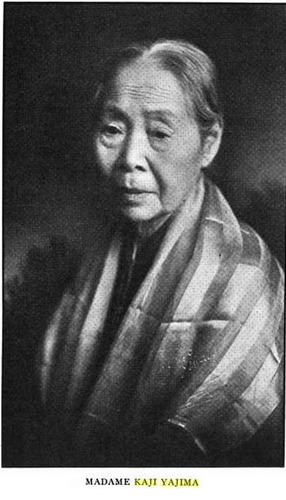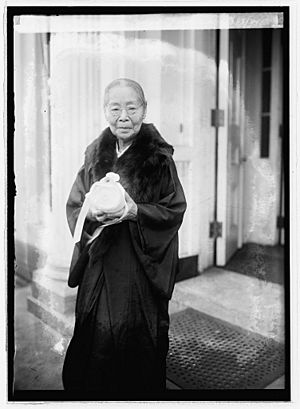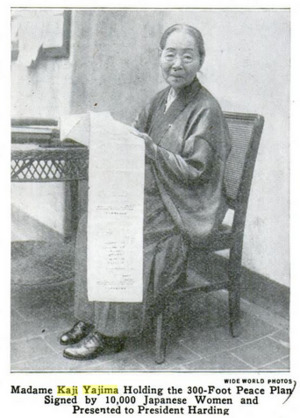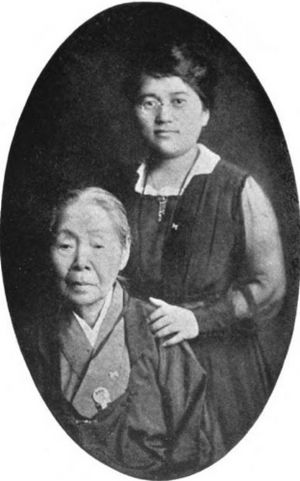Yajima Kajiko facts for kids
Yajima Kajiko (born in 1833, died June 16, 1925) was a very important Japanese woman. She started the Women's Reform Society and led Japan's Woman's Christian Temperance Union. Yajima was a teacher, a peace activist, and a Christian leader. She worked hard to improve education for women in Japan. In America, people often called her Kaji Yajima.
Yajima worked with Toyoju Sasaki, who was the secretary of Japan's WCTU. They both tried to change old customs that made Japan seem weaker than Western countries and women less important than men. Yajima especially believed in temperance, which means avoiding alcohol. Later in her life, Yajima went to international meetings about peace and temperance. She also met with American suffragists, who were women fighting for the right to vote.
Contents
Early Life and Education
Yajima was born in 1833 in Kumamoto, Japan. She was the sixth child and fifth daughter in a well-known farming family. Because she was a girl, her parents did not pay much attention to her. At that time, there was a belief called danson johi, which meant that men were respected more than women. This idea shaped Yajima's early life.
She received a traditional education for girls. When she was twenty-five, she married a samurai named Hayashi Shichiro. Her marriage was challenging. She eventually left her husband and moved to Tokyo to care for her brother. Since teaching was one of the few jobs women could have, she became a teacher in Tokyo's new public school system. Later, she moved to a Presbyterian mission school because it paid more. During this time, she became interested in Christianity and began working with a missionary named Maria True.
Career and Activism
Teaching Career
Kaji Yajima was the headmistress of a Presbyterian mission school for girls in Tokyo. She held this important role for forty years, helping many young women get an education.
Women’s Christian Temperance Movement
In June 1886, a missionary named Mary Clement Leavitt visited Japan. Her speeches were very popular and inspired Yajima to start a group. Later that year, Yajima helped create the Tokyo Woman's Christian Temperance Movement (WCTU) with twenty-eight other women. Yajima became its president, and Sasaki Toyoju was the secretary.
Because of her own family experiences, Yajima strongly disliked alcohol. She believed that temperance (avoiding alcohol) was the most important issue for the WCTU. She felt that members should "assist their husbands in the home" and "help gentlemen in society" by promoting temperance.
Yajima was president until 1889, when an accident made her resign. Three years later, she was re-elected and returned to her role. She continued as president until 1921, when she finally left the position permanently. During her time, she edited a Japanese temperance newspaper, gave speeches, led protest marches, raised money, and represented Japan at international meetings.
International Work for Peace
Even in her seventies and eighties, Yajima traveled abroad for her leadership work. In 1906, she spoke at the WCTU world convention in Boston, USA. On that trip, she also visited other American cities and met with President Theodore Roosevelt at the White House.
In 1920, she traveled with Tsuneko Yamada Gauntlett and Michiko Kawai to London and Geneva for international meetings on temperance and women's voting rights. In 1921, Kaji Yajima paid her own way to Washington, D.C., for the Conference for the Limitation of Armaments. She went with her assistant Azuma Moriya. There, she met American women fighting for voting rights and also met President Warren G. Harding. She gave him a 300-foot-long petition for peace, signed by many Japanese women. Prince Tokugawa even held a special event for her at the conference. During the same trip, she visited New York City to speak to various Christian groups, including the Young Women's Christian Association.
American newspapers and magazines wrote about her 1921 visit. She used these opportunities to share her hopes for world peace. She told people, "When I am gone, remember that I stood here looking into your faces expressing the hope that you will do all that is in your power as this old body will, that the world may know peace from now on." She also sent a message to "Christian women of America," saying that "the women of Japan want education, not battleships or armies. They want the government to spend money, not on military establishments, but on schools."
Personal Life and Legacy
Yajima had three children. She became a Christian in her middle age and was baptized as a Presbyterian when she was 45. She lived through the 1923 Great Kantō earthquake and passed away in 1925 at the age of 93.
After her death, the building where the Japanese WCTU had its offices was named after Yajima. In the 1950s, her life story was shared in American Christian books as an example of overcoming challenges and making a fresh start.





